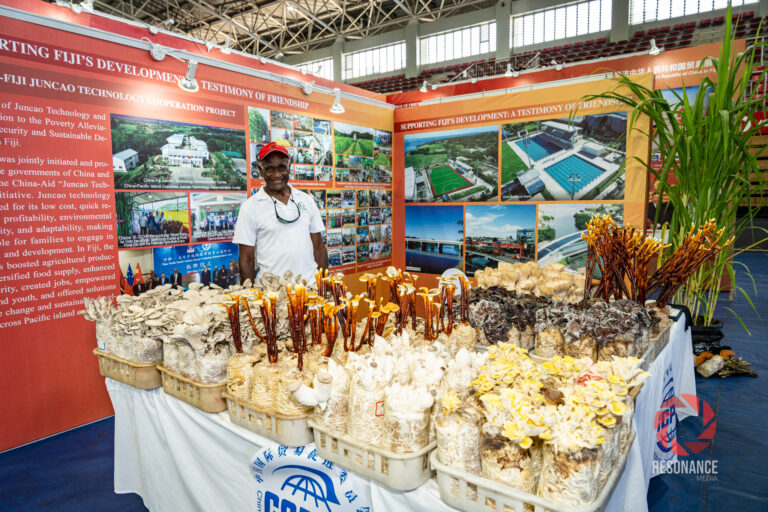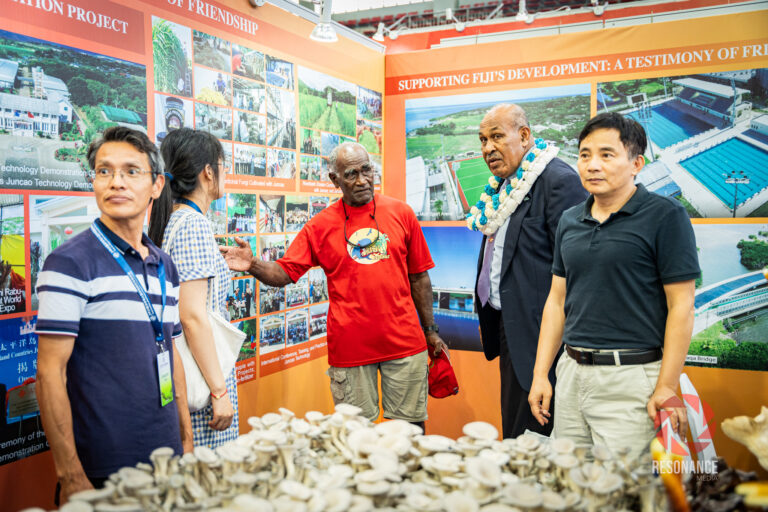The China-Fiji Juncao Technology Demonstration Center is gaining significant
attention at the Trade Exhibition of the People’s Republic of China in Fiji,
showcasing the benefits of Giant Juncao Grass. Located prominently at the
entrance, the center’s table features an array of mushrooms, drawing attention to
this innovative agricultural technology.
What is Giant Juncao Grass?
Giant Juncao Grass, known as (菌 草) pronounced “Jun Sao” in Chinese,
translates to “fungus + grass.”
This versatile plant has been in Fiji since 2014 and was invented by Professor
Lin Zhanxi in 1986. The grass serves multiple purposes:
- Mushroom Production: The grass is a substrate for cultivating various mushrooms (11 species to be exact), which are now being offered in Fiji for farmers.
- Livestock Feed: It provides high-quality feed for livestock.
- Ecological Management: The grass helps improve soil quality by holding soil and enhancing salinity levels.
- Biomass Energy: In China, it is also utilized for biomass energy production.
The center not only serves Fiji but also exports its products to other Pacific
Island nations, including Vanuatu, Tonga, Samoa, and Micronesia.
Bi-Products of Giant Juncao Grass
The cultivation of Giant Juncao Grass leads to several valuable bi-products:
- Mushroom Products: These include tea, capsules, mushroom powder (used as a condiment), and mushroom paste, all focusing on health benefits.
- Industrial Materials: The grass can be processed into particle boards and silk materials, with a composition of 70% Giant Juncao Grass.
Agricultural Process
The process of transforming Giant Juncao Grass into mushrooms involves
several steps:
- Harvesting: Matured grass is harvested.
- Preparation: The grass is shredded into large pieces, sun-dried, and ground into powder.
- Mixing: The grass powder is combined with wheat bran, water, and lime powder based on a specific formula.
- Packaging: The mixture is placed into heat-tolerant plastic bags.
- Sterilization: This step eliminates wild fungi, bacteria, and insects.
- Inoculation: Fungi are introduced into the bags.
- Mycelium Growth: The mushroom mycelium grows throughout the bag until fully covered.
- Ready for Planting: Once complete, these bags are ready for farmers to use.
Community Impact
Lele Tian from the China-Fiji Juncao Technology Demonstration Center
describes Giant Juncao Grass as a “win-win” plant. It not only generates
multiple products and bi-products but also enhances soil quality for future
agricultural use.
This technology represents a sustainable solution to food security and
environmental management in Fiji and beyond. The center has conducted visits
across various regions in Fiji including Naitasiri, Labasa, Rewa, Nadi (its base),
Rakiraki, Ba, Yaqara, and Nadawa to promote this innovative agricultural
practice. As interest grows in this eco-friendly technology, it holds promise for
improving livelihoods and fostering sustainable farming practices throughout
the Pacific Islands.
For those interested in learning more about this transformative technology and
its benefits, the China-Fiji Juncao Technology Demonstration Center will be at
the Vodafone Arena during the Trade Exhibition of the People’s Republic of
China in Fiji from the 21 st of November to the 24 th of November.
Doors open at 10 am daily till 6 pm and entry is free.







